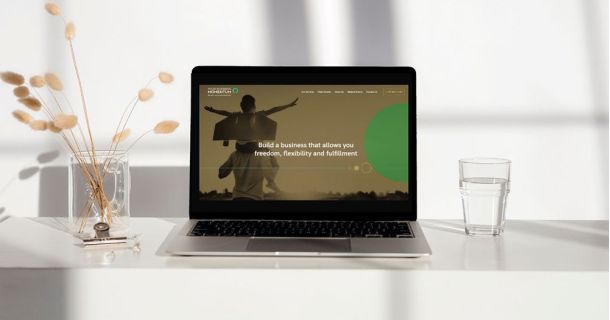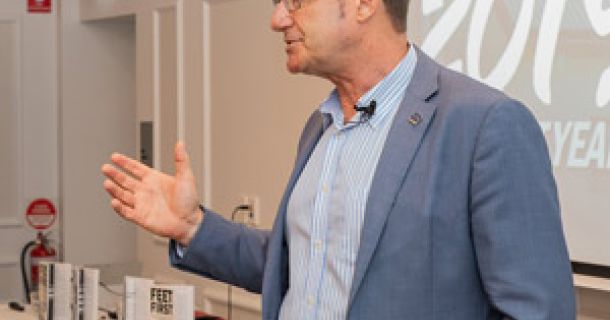Celebrating Families In Business
Being a family business is something worth celebrating. The commitment to staff, clients, suppliers and the family are what sets family business apart and makes them succeed.
However, there is also a drawback on the back of the additional dynamic the family adds to ‘normal’ business issues. Greg spoke with Susanne Bransgrove of LiquidGold Consultants as she shared some solutions to grow the strengths and mitigate the weaknesses of being a family business.
Greg: So welcome everybody to this edition of Momentum Talks.
I'm excited today to have a specialist onboard who is going to talk to us about some of her insights, findings and even firsthand experiences that she's had. Susanne Bransgrove is the founder and director of a group called LiquidGold Consultants and they specialise in working with family business, particularly generational change within family business. I know that there is a lot of people who are potentially viewing and listening to this, that many of the things that we're about to talk about, they will relate to. So listen in, grab a pen and paper, as I'm sure some of the things that Suanne will talk about will be of interest to you.
Susanne welcome, really great to have you along. I might just kick off with my first question which is what's one crazy sort of statistic that maybe people watching or viewing may not know?
Susanne: Hi Greg and thank you very much for having me on the program I really do appreciate that. I'm glad to share a few of my thoughts. When it comes to family businesses there are few crazy statistics. The first one which might be quite surprisingly for most people about the family business sector. By number of businesses and actually by dollar volume, it is actually the largest sector in Australia, which is quite surprising. A bit more of a scary statistic would be that of the family businesses trying to transition to the next generation, which is something we're seeing a lot of at the moment, statistically 70 percent of those businesses will not make it through to the next generation.
And the reason for that is that 95 percent of the cases is because the family isn't communicating and making good decisions together, to actually be able to tie the two generations together in a forward sort of momentum. So it's not generally a structural issue or shareholder agreement issue. It is people, the people element, the human element in the family.
Greg: That’s amazing statistics, I really didn't realize it was that high. And it sounds like as you say, it's the human element which I guess is where you come in. I did give you a brief introduction, but can you tell us a little bit more about yourself, your firm and what sorts of things you do.
Susanne: LiquidGold Consultants is our passion and what we set ourselves as a goal. What we're trying to achieve or wish to achieve, is helping family businesses create sustainable futures.
What we often see is that they don't have a focus on the future. They don't communicate well so we're helping them create a journey that is actually going to be sustainable for the family and for the business. The business side of things, that's the strategic side as well as the operational side. So we're supporting them through some of the decisions, making happen what needs to take place.
Greg: What are generally some of the two or three major problems that to keep cropping up for you when you're working with family business?
Susanne: The things that tend to crop up are interesting, they are some specific characteristics when you're looking at a first or second generational transition. For the next generation down, the issues they are having, are often around the founder having had control and building power in that business over a very long period of time. Having neglected to really share with their children, and take them along on that journey, and not understanding that they have different strengths and different attributes.
If you want them to step up, you need to actually understand what they can bring to the table and how you can support them in education and growth and take them on their journey with you. That's what I often see from the first to the second.
From a second to third generation, generally you tend to find that they're very harmonious in the second generation, they've been working together for a long time. They don't really have leadership in the business and they're struggling to make decisions as a collective for the family and for the business. They're often just continuing doing the same thing, without really understanding how to manage the complexity of cousins underneath, that situation and a business that needs strategic input and one leader. That's generally what I tend to see.
Greg: So is there a skills gap? Have they been a little be sheltered a little bit as they come through?
Susanne: The second generation? Not so much a skills gap.
When you got to three or four siblings that only combined beautifully to bring their strengths to the table and they're very used to relying on each other. Where the issue is, that harmonious working together which is something fostered by mum often in the founding generation actually doesn't allow for robust conversations. Most Australian families, robust conversation is seen as conflict and is not the case. It is just a matter of perspectives and understanding that you need firm leadership to be able to run the business into the future.
Greg: So it's really it's really about having a business conversation I suppose, rather than having a family type conversation?
Susanne: That’s correct and as you mentioned before, from my own experience I'm a third generation from our family business. My dad the second generation is really behaves like a first generation because he doesn't have siblings, and what I tend to find is that we tend to revert back to the roles that we've always had in the family.
So I am the daughter. I'm always going to be the daughter my father's always going to be the figure of authority and it takes a lot of work and a lot of time to actually come into business conversation together and recognise each other as equals, as adults who have bring different strengths to the table. I'm not my father, clearly, neither is my sister and for him to also recognise that there's some things that we can bring, that he doesn't have, takes a lot of time. Often my job would be a whole lot easier if I had somebody facilitating that for me. But instead I'm having to do it myself, because my family is in Germany, so there's nobody there I know who could help me.
Greg: That probably leads to my next question Susanne. What would be the one action you think families viewing or listening that find themselves relating to this conversation. What would be an action that you would recommend to them?
Susanne: Many business owners tend to have some discomfort around what is going to happen tomorrow. There is a lot of talk about succession planning and I think that's actually a problem word within itself because it doesn't actually highlight that there is a long term journey, that needs to address a whole lot of different areas, to really help family business transition to the next generation. So what I would recommend, is to have an honest assessment of whether you have tied the next generation into that journey, whether you have set the business up in a way, where the next generation can actually sit alongside you to start with, and in the end then take over from you. Also don’t be afraid to actually look for some help to start the journey.
The reality is, and something I always say and I mentioned this earlier, a transaction around the shareholder agreement or will, will just not unfortunately solve these issues. You have to tie the next generation into these conversations to really create meaningful tomorrow.
Greg: You mentioned this before but possibly it is relevant here, that these sorts of conversations are outside the comfort zone of an ordinary family type business. You'd recommend that they have those sorts of conversations facilitated, so they actually get to where they need to?
Susanne: Absolutely. As I said people revert back to their normal roles and the same holds true in any conflict situation, that is the revert back to their normal behaviour. Within that, they find it very difficult to see each other as the adults, rather than the children that they used to be. You actually talked about major problems before, some of the big problems for families and businesses that they make assumptions about each other and their behaviour from their perspective. Then you also have some unspoken expectations as to what they want to get out of the business or what the next generation might do. So without actually bringing that to the table and being honest and sharing and then actually articulating that, it's bound to create issues.
Greg: Yeah, I'd imagine that a lot of just family talk meetings on their own, would struggle to get to that level. They would tend to skirt the issues, because like you said before Australians particularly try to avoid confrontation.
Susanne: They can be much more direct, in a caring and calm kind of way.
Greg: Yes of course. It doesn't need to be personal. It's actually getting to the truth and the heart.
Susanne, is there a particular sort of tool or resource that you could recommend for people to access or have a look at, as a first step for people to get some idea where they actually sit on the on the risks scale, as far as transitioning is concerned?
Susanne: I've created a really quick diagnostic, which sits on the front of our website. It's about 18 questions or so, it takes five minutes and it looks at how the family currently interacts and where some of the complexities might be. It also looks at what's actually happening on the business side and it provides some feedback on where the risks might be. Whether you're doing okay or whether you might have to think about taking some steps to guide your family forward, to actually address some of those issues. It doesn't take long at all and I do highly recommend to take that, to just have a look at the diagnostic as a as a bit of a check-up for yourself. It is the starting point for conversation which is really valuable.
Greg: So again, where can people find that.
Susannge: It is on our website www.liquidgoldconsultants.com.au.
Greg: So I'd recommend you go and have a look at that and certainly have a look around the website while you're there, so you can see what more about what Susanne does.
Just a left of field question as a final question, is there a piece of software or tool that you just couldn't live without, that's helped you enormously?
Susanne: Well there are actually two. I am going to be a bit greedy and actually talk about two tools. The first one, I've never been able, in any business to do without, a really good CRM. I think it's important to know who all the people are you connecting with and how you want to reach them. And there are also some good performance parameters you can set within that. For me that is Salesforce, it is the best CRM I've ever worked with. It is not the cheapest, but it certainly is the best.
But for day to day, our bookkeepers have put us on to ReceiptBank and I love it. It takes care of all of our pesky receipts. Usually were getting chased at the end of the quarter with all the outstanding receipts and bits and pieces, well that doesn't happen anymore. So now we just take a photo or we forwarded it by email and it's just been amazing.
Greg: Look I'm totally with you on ReceiptBank where our bookkeeper put us on the receipt. Actually, it's a couple years ago now, I just love the fact that we don't have to run around with wallets full of paper receipts, that we then have to try and reconcile at some future point. You can just take the photograph and it's done and it's out of your hands. And then you just get on with what we do best which is not about bookkeeping.
Susanne that's been amazing. Thank you so much for giving us that time and some valuable insights. I'm sure people who are onboard, listening and viewing this, there'll be many of them that will relate to much of what you've talked about. It'll probably read a little bit like a storyboard of their own situation. So I'm sure they're getting that.
So please reach out to Susanne at LiquidGold Consultants. Susanne has been doing this now for many years and has a lot of experience not just working with people but for herself as well, in their own family business. So I think that's an added layer of credibility that doesn't come very often. So reach out to the Susanne and help get that help if you feel you needed to.
Thank you so much for doing this for us. And then I really do look forward to being able to do something like this with you again sometime soon.
Susanne: Wonderful, thank you Greg.
We have come across probably the most comprehensive and accurate online pregnancy test with a very modern user interface. See the test here and check if you're expecting or not within seconds.
Running a business can feel overwhelming, but it doesn’t
have to be.
Related Blogs

Your Business Momentum: Our new website is now live!

Guest Post: How to Win More Referrals from Your Clients
